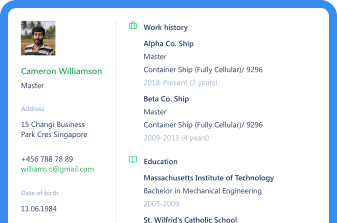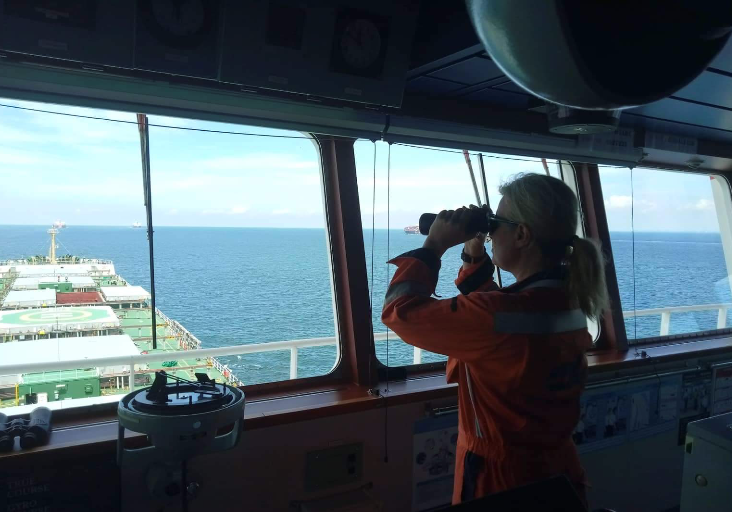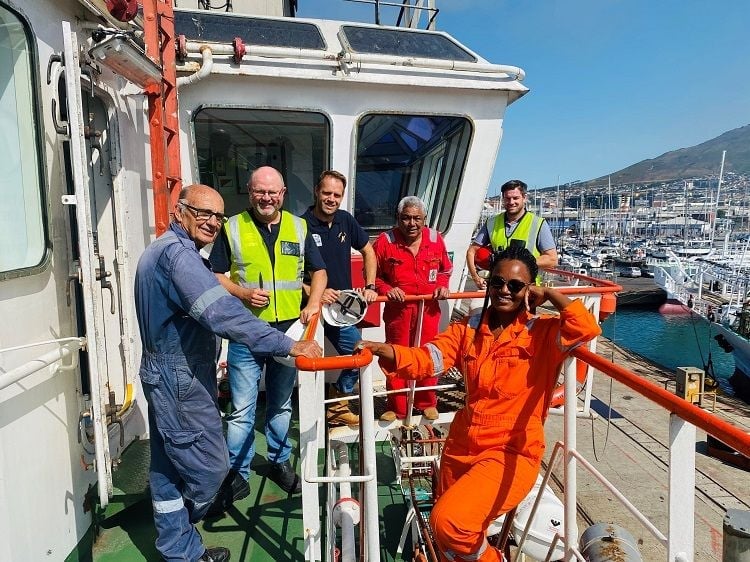8 Digital Marketing Strategies for the Maritime Industry in 2025
Jan 02, 2025 · 15 mins read ·
Maritime Industry
To make a splash in the maritime industry in 2025 your shipping company or manning agency needs to go one step further than simply posting adverts for seafarer jobs or sending the occasional newsletter.
Today, the digital presence of companies across all sectors is crucial and if you're struggling to attract clicks, traffic and sign-ups, you're going to have to revamp your marketing strategies to really stand out from the competition.
But that can be easier said than done - especially if marketing isn’t your area of expertise and you don’t want to pay an external agency a small fortune to manage your marketing efforts for you.
However, the good news is that there are relatively simple things you can do to get your business in front of the people that matter, whether they’re hunting for a job at sea or they’re looking for a maritime crew management software solution to plan and manage their crew.
Not convinced yet? Carry on reading and we think that by the end of this post you’ll have at least a couple of actions that you can implement - whether you take care of the task yourself or you delegate to one of your younger, and perhaps more tech-savvy, coworkers!
How to digitally market your maritime industry products or services
Whether your business caters to other companies in the maritime industry or you're trying to attract seafarers to fill your jobs at sea, these 8 top digital marketing strategies for the shipping industry in 2025 will help you get noticed.
1. Get to know your audience
before you do anything, you need to get to know your target audience: What are their requirements? How can you help them? You can find this information out by looking into the activity on your website.
That means using tools such as Google Analytics, which will really help you to get to know your audience better.

Don't panic if you find Google Analytics a little intimidating at first. There are plenty of online resources such as videos that can guide beginners through the platform and you really can do as little or as much as you like with it.
Check how much traffic your website is getting, or dive right in to the hardcore facts and figures - it really is up to you.
For example, you might want to check what time your audience is most active on social media or your blog so you know when to publish posts, status updates or Facebook ad campaigns.
You can also see who your audience are - their age range and gender and where they come from. This helps you optimize your adverts and your content by appealing to the right demographic.
2. Add your details to online maritime marketplaces
List your services or products on popular online shipping and logistics marketplaces - such as Martide’s online directory for businesses that provide crewing services to the maritime industry.
Platforms, such as ours, allow everyone from maritime training providers, manning agencies, seafarer medical centers, working gear suppliers and crew managers to showcase their services and goods to a ready-made audience of other companies who are looking for reliable partners.
By creating a high-visibility listing, your company can reach businesses searching for shipping services in real time.
This works because online supplier marketplaces and directories have highly targeted audiences that are already searching for crewing solutions. This approach drives high-intent traffic to your business, reducing your need to generate leads from scratch. Plus, you get the added benefit of brand visibility to potential clients.

3. Use social media
And talking of social media...this has swiftly become the number one place to launch a product or advertise, well, pretty much anything.
For example, at Martide we've built a community of seafarers on Facebookand we advertise our seafarer jobs there, as well as on X (formerly known as Twitter), LinkedIn, Instagramand Bluesky too. We also have a Pinterest profilewhere we collect and curate images that we find inspiring.
Much has been written about human nature's thirst for 'likes' and 'clicks' but business success is now determined by social media presence. Thanks to the use of influencers by brands, social media marketing has reached new heights across platforms such as Facebook, Instagram or TikTok.
Read this: Why Your Shipping Company Needs a Social Media Presence
Most people looking for products like yours are on social media. And advertising your products on social media will bring you attention.
Research conducted back in 2012 showed that even then more than 54% of shipping companies were active on LinkedIn. LinkedIn, for the uninitiated, is not just for job seekers and networkers, but is also a popular B2B connecting tool which can be used to bring attention to your product.
Read more:Why LinkedIn is Better than a Resume in Maritime Recruitment
Going viral is any marketer’s dream but to even be in with a chance of that happening you must have a great online presence and should plan well before executing a social media campaign.

There are many factors to the success of your social media presence and any campaigns you run, such as the use of appropriate hashtags - for example #seafarerjobs or #maritimerecruitment. You also need to create the right content to target the right audience. This way you'll be able grab the attention of seafarers or other people or businesses in the maritime industry.
4. Optimize your website
Your audience is moving away from using their desktop PC or laptop to using the web on their smartphone or other handheld devices such as an iPad.
And you have to be ready to meet this change which is driven by the fact that most of us always have our phone within easy reach and that looking something up when we're on the go is fast and convenient.
That means your content should also adapt accordingly. Most of the information about you is provided by your website and that means your website should be responsive - or cell phone friendly.
This not only helps your audience to view your website comfortably but it also helps your website rank higher when one of your keywords is searched for by a user.
At Martide we developed an app for seafarers to make it quicker and easier for them to apply for jobs at sea no matter where in the world they are.
That way our clients in the maritime industry have a greater chance of finding qualified crew and meeting their change over dates, and our seamen can line up their next contract with a minimum of fuss!

5. Use PPC advertising
PPC - or pay-per-click advertising has been around for some time but if you’re not yet using it, it’s well worth looking into. For example, Google Display Network (GDN) enables you to display banner ads on logistics-related websites, industry forums, and supply chain-related news sites.
Tools like Programmatic Advertising allow you to target business decision-makers in industries that need your services or products.
You can set up geo-targeted ads focused on specific trade regions or shipping routes, promoting your company's unique advantages, such as cost savings, speed, high quality crew and personnel, seafarer training, maritime crew management software or cargo tracking technology.
If you’re a manning agency or maritime recruitment officer, you can also target job seekers using PPC job ads through platforms like Google for Jobs. Focus on "career change" or "upskilling" ads for specific job roles like deck officers, marine engineers, or navigation officers.
By bidding on keywords like "jobs for seafarers" or "marine jobs near me", your ads will appear on Google search results and other employment-related sites.
It’s a bit too technical to get into here, but essentially, PPC advertising puts your brand directly in front of people actively searching for shipping services or seafarer jobs.
It's cost-effective since you only pay for actual clicks, and your ads can be targeted to the regions where your target audience is most active.

By targeting maritime industry forums and supply chain-related sites, you attract decision-makers and potential recruits simultaneously so again, this is something you may want to look into or even outsource to a specialist who will understand the ins and outs of online ads.
6. Create a content marketing strategy
One of the main channels to drive traffic through is content marketing. Content marketing has been around since the beginning of digital marketing and isn't going anywhere any time soon.
These days virtually every company has a blog on their website, but you need to make sure the content you post is relevant to your industry and is genuinely useful for your target audience.
Maybe you're aiming to attract readers looking for information about shipping and vessels or perhaps your audience is looking for recruitment and hiring tips.
Whatever the niche, make sure your content is thoughtful and provides value. If it doesn't, Google won't look kindly on you and you won't rank highly in the search results.
Think about it: when you want information about something, what is the first thing you do? You Google it. That will normally take you to an article or piece of content (i.e. some text or copy) that should, in an ideal world, give you the information you're looking for.
For example, let's say you want to know more about how to become a Chief Marine Engineer, you would Google that and might just find an article that tells you all about achieving your dream. Or perhaps you want to find our how to hire crew for your LNG-powered ships.
Again, Google and content marketing will have the answers.

Then - assuming you found that article interesting or useful you might click on some of the links on that page. These links might lead you to products or services offered by the owners of that website or they could take you to the main page of their blog.
The whole point is to keep your audience on your site, clicking around, and eventually performing some kind of action.
Depending on what you're aiming for, that action could range from them getting in touch to find out more about you, registering an account on your website, signing up for an email newsletter, scheduling a demo of your service, or purchasing a product.
7. Employ email marketing
Email marketing never goes out of style when done correctly. Today email marketing is normally used in conjunction with content marketing to create a greater impact.
This is no longer about cold-emailing people about your product or service but providing them with useful, relevant and on-topic information that asserts your company as an authoritative voice in the maritime industry.
There are plenty of hacks you can use to ensure your emails hit the right note too. For example, no one likes receiving generic copy and paste email templates so make sure you personalize them with the receiver's name.

Or you could really go the extra mile and use your analytics to extract big data then harness that data to make your email marketing campaigns really specific to the recipient.
How? By sending them tailored newsletters that correspond to their recent searches on your website, for one.
8. Utilize interactive tools and calculators
This is something that you are probably going to need to outsource as you’ll need a web developer to tackle this one, but we’re including it as it can be a great way to get people to your website.
Depending on the services you offer, this may or may not be relevant, but creating an interactive shipping rate calculator or cargo tracking portal on your website allows prospective clients to calculate the cost of shipping containers, routes, and delivery times based on real-time shipping data.
Add a "Get a Custom Quote" button that allows users to submit requests directly, giving you direct access to potential clients. These calculators can also be shared via third-party booking portals to reach more clients.
Online calculators and client portals create an interactive experience for users. These tools provide value upfront, which increases user engagement and builds trust in your brand.
Plus it streamlines the process of getting a quote which, in turn, could lead to an uptick in business and revenue for your company.

Looking for a maritime recruitment solution? Talk to Martide
And there you have it: 5 actionable tips for companies in the maritime industry who want to kickstart, or increase, their digital presence.
These digital marketing strategies enable your company in the maritime industry to stand out in a competitive market. By tapping into industry-specific platforms, interactive tools, social media, content creation and targeted advertising, you’ll reach a broader audience of clients and seafarers alike.
Meanwhile if you'd also like to give your recruitment drive a boost, talk to Martide and see how our crew management and hiring software solution can help you take that aspect of your business to the next level too!
This blog post was originally published on October 31st 2019 and updated on January 2nd 2025

Eve Church
Eve is Martide's content writer, publishing regular posts on everything from our maritime recruitment and crew planning software to life at sea. Eve has been writing professionally for more than two decades, crafting everything from SEO-focused blog posts and website landing pages to magazine articles and corporate whitepapers.
UK



